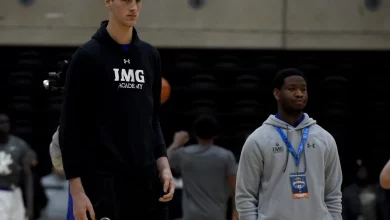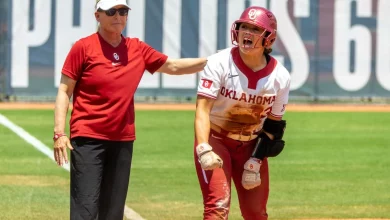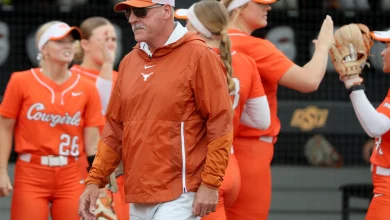Stars’ Jake Oettinger Admits Being ‘Surprised’ by Bench but Says He Needs to ‘Do Better’

In the intense atmosphere of the NHL playoffs, every decision, every save, and every goal carries monumental weight. For Dallas Stars goaltender Jake Oettinger, the 2024 Western Conference Final brought a moment that caught both fans and the goalie himself off guard. After being unexpectedly pulled early in Game 5 against the Edmonton Oilers, Oettinger openly admitted his surprise over the benching but took full responsibility, acknowledging the need to improve his game.
This candid admission sheds light not only on the pressure cooker environment of playoff hockey but also on Oettinger’s character and growth as a player. Let’s dive into the details of that moment, the reactions, and how the goalie has responded to the challenge.
The Context: Stakes at Their Highest
The Dallas Stars’ playoff run in 2024 has been a rollercoaster of emotion, resilience, and relentless effort. Coming off a strong regular season, the team found themselves in a nail-biting Western Conference Final against a formidable Edmonton Oilers squad, led by superstars Connor McDavid and Leon Draisaitl.
The series was tied 2-2 heading into Game 5, making the upcoming match a pivotal moment that could swing momentum significantly. With the pressure mounting, every player was aware that mistakes would be costly.
Jake Oettinger, the Stars’ 27-year-old starting goalie, had been solid throughout the season and earlier playoff rounds. But Game 5 brought a surprise that no athlete wants to face: an early benching after allowing two goals in just over seven minutes.
The Unexpected Bench: What Happened?
The moment came early in the first period. Oettinger faced two shots and allowed two goals, a tough start against a hungry Oilers team. Head coach Peter DeBoer made the difficult but strategic decision to pull Oettinger in favor of backup Casey DeSmith.
The decision sent shockwaves through the arena and instantly became a talking point in the hockey world. Fans and analysts alike debated whether the move was fair or if it would damage Oettinger’s confidence.
For Oettinger, the moment was a jolt.
Oettinger’s Reaction: ‘Surprising’ but Accountable
In interviews following the game, Oettinger did not shy away from expressing how unexpected the benching was for him.
“It was definitely surprising to be pulled that early,” Oettinger said. “I felt like I was ready, but sometimes in the playoffs, things happen fast.”
However, rather than deflect blame or express frustration, Oettinger took ownership of his performance.
“At the end of the day, I have to do better. That’s on me. I need to be sharper, more focused, and ready to give my team the best chance to win every night.”
This level of accountability highlights Oettinger’s maturity as a player who understands the realities of professional sports — that even the best can falter, but how they respond matters most.
The Coach’s Perspective
Coach Peter DeBoer, known for his calm but decisive leadership style, addressed the benching in press conferences with a focus on the team’s needs.
“It wasn’t a reflection on Jake’s overall ability,” DeBoer said. “It was about what the team needed in that moment — a change in momentum.”
DeBoer also expressed confidence in Oettinger’s abilities, emphasizing that the decision was tactical, not personal.
“Jake is a big part of this team, and we believe in him. This is a long series, and we expect him to bounce back.”
Such statements reflect a healthy team culture where difficult decisions are made for the good of the group, and players are supported through adversity.
Fans’ and Analysts’ Reactions
The benching divided opinion among fans and hockey commentators. Some argued that the move was too harsh given Oettinger’s overall solid performance in the series. They pointed to the small sample size of the two goals allowed and noted that even elite goalies have moments of early struggle.
Others agreed with DeBoer’s decision, arguing that playoff hockey demands immediate adjustments and that sending a message can sometimes be necessary to rally the team.
Former NHL players and coaches weighed in on the situation, emphasizing the mental toughness required for goaltenders.
The Mental Game: How Goalies Handle Pressure
Goalies face unique pressures in hockey, especially in the playoffs. Unlike skaters, whose errors can sometimes be distributed across the team, a goalie’s mistakes are magnified and can directly influence outcomes.
For Oettinger, the sudden benching was not just a physical challenge but a psychological one. His public admission about being surprised but accepting responsibility shows an understanding of this mental aspect.
Sports psychologists often highlight the importance of resilience, “short memory,” and focus for goalies. Oettinger himself has spoken about drawing on mental techniques to reset quickly after mistakes, a crucial skill at this level.
Oettinger’s Path to Growth
Jake Oettinger’s journey to becoming a top-tier NHL goalie has been one of steady development. Drafted by Dallas in the first round of the 2017 NHL Entry Draft, he quickly made a name for himself with his size, athleticism, and calm demeanor.
Over the years, he has worked tirelessly to refine his technique, including positioning, rebound control, and puck handling. His save percentages and goals-against averages have consistently improved, earning him the trust of coaches and teammates.
However, moments like the Game 5 benching serve as reminders that growth in professional sports is continuous, requiring adaptation and learning from adversity.
Support from Teammates and Organization
Following the benching, Oettinger received a wave of support from teammates and the Stars organization. Players like Joe Pavelski and Roope Hintz publicly voiced their confidence in Oettinger’s abilities and character.
Such backing is crucial in maintaining morale and reinforcing a sense of unity within the team, especially during high-pressure playoff runs.
Looking Ahead: Redemption and Resilience
The story is far from over for Jake Oettinger. With multiple games left in the series and the potential for a Stanley Cup Final appearance, Oettinger has the opportunity to prove that he can learn from this experience and come back stronger.
Historically, many great goalies have faced setbacks only to rise and cement their legacies. The ability to bounce back, adapt, and perform under pressure is what separates the good from the great.
Oettinger’s public acknowledgment of his need to “do better” is a promising sign that he possesses this mindset.
The Broader Impact: Lessons in Professionalism
Oettinger’s candidness offers lessons beyond hockey. In any high-performance field, facing unexpected setbacks can be challenging. His approach—owning the moment, learning from it, and committing to improvement—is a blueprint for resilience.
Moreover, his experience underscores the importance of strong leadership and supportive team environments in navigating adversity.
Jake Oettinger’s benching in the Western Conference Final was a dramatic and emotional moment, but it is also a chapter in a much larger story. His surprise at being pulled, combined with his mature acceptance of responsibility, highlights his growth as both a player and a person.
As the playoffs progress, all eyes will be on how Oettinger responds. His determination to improve and his resilience will be critical not just for his own legacy, but for the Dallas Stars’ hopes of capturing the Stanley Cup.
In the unforgiving world of NHL playoffs, setbacks are inevitable, but so are comebacks. For Jake Oettinger, the best is yet to come









